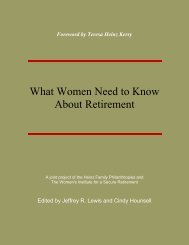What Women Need to Know About Retirement - Wiser
What Women Need to Know About Retirement - Wiser
What Women Need to Know About Retirement - Wiser
You also want an ePaper? Increase the reach of your titles
YUMPU automatically turns print PDFs into web optimized ePapers that Google loves.
Medicare Has Four Parts: A, B, “C,” and D<br />
Original Medicare Plan<br />
Medicare Advantage Plans<br />
Medicare provides this coverage Provided through an HMO or PPO<br />
Part A Part B<br />
called<br />
Hospital Medical<br />
“Part C”<br />
Part B is Private insurance companies approved by Medicare<br />
optional provide this coverage.<br />
Part D<br />
Part D<br />
Prescription Drug Coverage<br />
Prescription Drug Coverage<br />
You can choose this coverage. Most Part C plans have drug coverage. If they don’t,<br />
Private companies approved by<br />
Medicare run these plans.<br />
you may be able <strong>to</strong> choose Part D coverage.<br />
Different plans cover different<br />
drugs.<br />
Source: CMMS Medicare and You, 2007<br />
Typically, you are eligible for Medicare at age 65 if you or your spouse paid Medicare payroll<br />
taxes while in the paid labor force. If you are divorced, and were married for more than 10<br />
years, you may qualify for Medicare benefits based on your former spouse’s work record. For<br />
more information on who qualifies, go <strong>to</strong> Frequently Asked Questions at www.ssa.gov.<br />
Medicare Part A (Hospital Insurance)<br />
<strong>What</strong> is it? Medicare Part A helps pay for your inpatient care in a hospital and provides limited<br />
coverage for care and rehabilitation immediately after you get out of the hospital in a skilled<br />
nursing facility and in your home. Many people mistakenly assume that Medicare will provide<br />
for their long-term care. It will not.<br />
<strong>What</strong> does Part A cover? In addition <strong>to</strong> inpatient hospital stays, Part A covers skilled nursing<br />
facilities that provide skilled nursing and rehabilitation, hospice care, psychiatric inpatient care,<br />
and some home health care such as physical therapy ordered by a doc<strong>to</strong>r. However, these afterhospital<br />
services have very strict qualifying rules and are time sensitive.<br />
Skilled Nursing Facility: While Medicare Part A does not cover typical nursing<br />
home care, it does cover care in a skilled nursing facility. However, coverage is<br />
limited <strong>to</strong> a maximum of 100 days per benefit period, with coinsurance payments<br />
required after day 20.<br />
Home Health Care: Medicare may provide “necessary and/or intermittent”<br />
skilled nursing care, home health aids, physical therapy, and occupational therapy<br />
that are ordered by a doc<strong>to</strong>r and provided by a Medicare-certified home care<br />
agency. Medicare may also provide for durable medical equipment for use at<br />
home—things like a wheelchair or walker.<br />
Hospice Care: Medicare provides home health and other services, as well as<br />
drugs for pain relief and respite care for people with less than six months <strong>to</strong> live.<br />
Lifetime Reserve Days: If a person is in the hospital for more than 90 days,<br />
Medicare provides a <strong>to</strong>tal of 60 “reserve” days that can be used over a lifetime.<br />
40




